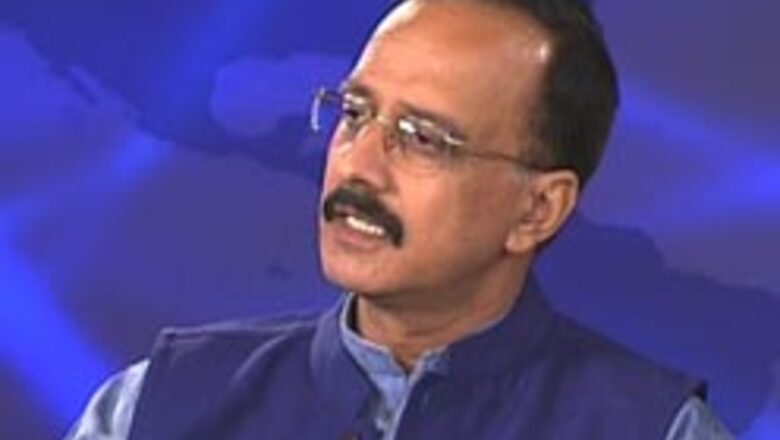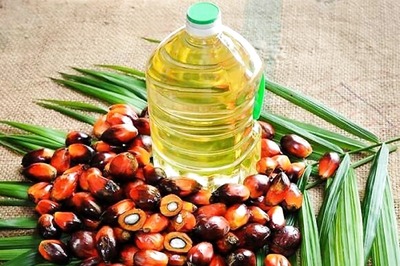
views
In order to curb rising inflation, the Government recently scrapped import duties on crude edible oils and banned exports of non-basmati rice.
But can such short-term populist measures work in actually checking inflation?
Keeping in mind that there are elections lined up in four states this year, how will this affect the UPA's political standing?
In order to get a clear picture of the ongoing inflation story, IBNLIve.com organised a chat with food policy analyst Devinder Sharma.
Here we reproduce the full text of the chat.
Niksun freshers: Do you think that the rise in consumption and production of FMCG goods and booming of the retail sector have any effect on price of the necessary commodities?
Devinder Sharma: Yes, the retail sector and the FMCG have a direct role to play in rising inflation. Futures trading in agriculture commodities is one major reason for the rise in prices.
Dr Vikas Bajpai: Could you kindly explain in the layman's language as to how futures trading affects our food security?
Devinder Sharma: Futures trading is a casino. It is mere speculation. The prices that go high on the stock market will have an impact on the retail prices, as a result of which the inflation goes up. Futures trading should be abolished. Futures trading has not helped the American farmers. The US has future trading in agriculture and, at the same time, also has the world’s biggest commodity exchange in Chicago. And yet, American farmers only survive if they get direct income support from the government. It clearly shows that we are importing a faulty model from America.
Srivatsa M: Do we have proper storage facilities to store our foodgrain and is the government doing enough to encourage private-public partnerships to come up with solutions to the problems?
Devinder Sharma: We don't have proper storage facilities, as a result of which 40 per cent of our fruits and vegetables rot. The government is laying emphasis on agri-business but I don't think the kind of businesses that we are bringing and the way we are bringing will help find the right kind of solutions. For instance, we can't allow companies which manufacture fruit juices in cartons to import the juice concentrate from the US/South-East Asia. The objective should be to use Indian raw material, otherwise the basic objective is defeated.
Srivatsa M: How do you think we can increase the agricultural productivity in our country? Are our farmers losing focus on the fertility factor, which has caused the drop in foodgrain production?
Devinder Sharma: By going in for conservation agriculture, and simultaneously providing farmers with a fixed monthly income. If the farmer is happy, he will produce more.
Gokul Prasad: What are the direct subsidies provided by Western /developed countries to the farmer?
Devinder Sharma: Much of the US $ 350 billion that the 30 rich countries forming the OECD are in the form of direct income support. You can see my writings on the subject on the Net to see the kind of subsidies provided in EU/US.
Manish Sharma: What is your suggestion to curb the current inflation?
Devinder Sharma: My one-liner would be: bring the markets under control/regulations.
Niksun Freshers: Is there a requirement of one more harit kranti (Green Revolution) which may be the solution to rising inflation as well as the food shortage?
Devinder Sharma: The first Green Revolution had collapsed. The present agrarian crisis is the outcome of it. It is high time we first drew a balance sheet of the 1st Green Revolution to see where and how we have gone wrong before we embark upon another Green Revolution. Otherwise, we will commit the same mistake, and destroy the foundation of Indian agriculture.
Sanjay: At one time India was a world leader in cotton and textiles. It’s no longer so. Britain had financed their Industrial Revolution by fleecing their colonies. Now our other strength, agriculture, is also being put in jeopardy. Farmers are being forced to give up farming. Comment. Also, is there a way out?
PAGE_BREAK
Devinder Sharma: You are very right. The Indian government is laying out policies that push farmers out of agriculture. This will result in devastation on a scale we have not seen earlier. I think the policies in the past 15 years (and now the 11 Plan approach) will lead to the marginalisation of agriculture. What a tragedy.
Parvathy: The latest World Development Report calls for greater investment in agriculture in developing countries and warns that the sector must be placed at the centre of the development agenda if the goals of halving extreme poverty and hunger by 2015 are to be realized. What is your view on this?
Devinder Sharma: The World Development Report is like the Prime Minister of India. It uses the right vocabulary but goes for a faulty action plan. What the World Bank is actually saying is that agriculture needs more investment but talks about strengthening corporate control over land and other resources. The report also talks of encouraging land rentals and move people out of agriculture. India has to follow a model of farming which is India-centric. We cannot follow what is good for America or Europe. We have 600 million farmers and only agriculture can provide employment to such a huge mass. No industry in the world or no country in the world can provide employment to the people that would be displaced from farming if we go in for corporate control of agriculture and push farmers out of farming.
Gaurav Kansal: No improvement in agriculture has happened in the past five or more years. Even the UPA shelved the river inter-linking project. The UPA cannot just escape now by putting the blame on international prices and giving loan waiver to farmers. What do you say?
Devinder Sharma: There has been hardly any improvement in agriculture for the past 15 years. All governments after 1991 must take responsibility for the present agrarian crisis. I don't think inter-linking of rivers is the solution. It only benefits the engineers-bureaucrats-politician nexus. The more important thing should be to invest resources in sustainable farming systems and ensure that India produces more and that we don't have to import farm commodities.
Saju Joseph: How is it that a country like Israel, which is always short of rainfall, is able to increase its productivity and a vast country like ours with abundant rainfall and fertile land not able to give enough security to its people?
Devinder Sharma: Israel is too small a country for us take on as a model. In India, what is more important is to first look after farmers’ welfare. If our farmer is healthy and happy (with higher incomes), he, too, would be able to produce a higher crop.
Virendra Kumar Jain: When everybody is affected with the retail price, why is the government considering the wholesale price of the commodity? Does the Govt have any control on MRP printed over the packet?
Devinder Sharma: You are right. The Govt measures inflation from the wholesale price index and not retail price index. As a result of which the inflation figures we get are not a true reflection of the pinch that you and me feel. We should force the government to shift from the wholesale price index to retail/consumer price index as a true measure of inflation. Until then, we as a nation, are simply being kept in the dark.
PAGE_BREAK
Arvind Singh Dotiyal: Should the government's poor agri policies or the effect of global economy be considered responsible for the high inflation and high prices of basic commodities?
Devinder Sharma: Indian policies on agriculture are poor indeed. But the present inflation in food commodities is because of the unregulated market. The Essential Commodities Act has been almost withdrawn and that allows trade to go in for hoarding. For instance, with a bumper rice crop harvest expected this year, I don't see any reason for the rise in rice prices except that there is no control on hoarding.
Aseem Naphade: Can you first tell us what is the primary cause behind inflation? And then in today’s context what exactly is causing it? Is it because of the Budget? Or just because of the jump in food prices all over the world?
Devinder Sharma: The jump in global food prices is there, but I don't think inflation in India has that much to do with the global scenario. It is because of our fiscal policies and the unregulated market.
Nagarajan: Don't you think instead of politicising the inflation and food crisis, political parties should sit together and work on national policy? On the other hand, why doesn't the media create awareness about the wastage of food that takes place in hotels, marriages, parties and many other places? Why don't we observe no "shopping day" when we are in a crisis?
Devinder Sharma: I agree. The nation has to feel responsible. Remember when there was a food shortage in the country in 1965, Lal Bahadur Shashtri had started the Monday fast, and the nation had followed. We need to revive that kind of national spirit.
G K Kashyap: With the forecasts for growth rates declining and inflation heading high; do you consider it a sign of a slowdown? How will the government strike a balance between inflation and growth?
Devinder Sharma: I think we are too obsessed with growth figures. The tragedy is that 99 per cent of the country does not even know what constitutes growth. To me, the most important thing is to ensure that the larger proportion of the population is able to survive and live decently. If the inflation is on an upswing, it is the poor and the average citizen of this country who will feel the pinch. So we have no other option but to control inflation. The inequalities of growth have to be understood. Let us not be carried away by the 9.2 per cent growth that the Govt has been projecting as the end all solution.
Shafeeque: Is it possible to bring down the inflation rate by the Govt regulations? The Govt, on the one hand, is allowing grants and other financial aid to the society and ensure liquidity. But, on the other hand, they are going for restriction and tax cuts. Is it possible to control the inflation when there is high liquidity rate in the market? Why is the Govt not taking any steps to bring down the price of capital goods?
PAGE_BREAK
Devinder Sharma: It is possible. But the government seems to be more concerned at doing away with import duties, thereby opening the floodgates for future imports. You are right. The more availability of liquidity in the market is a reason for the current rise in inflation. The Govt should take steps to bring down the prices of capital goods. You are absolutely right.
Ajit: The Govt has announced moratorium for farmers, which seems to be a very short-term relief and that too not well planned as far I can get it. One of the biggest problems with farming is that it has become unprofitable and riskier in the last few decades. What do you think should be the short-run and long-run measures that India should take to make its agriculture sustainable and viable?
Devinder Sharma: You are right. The government needs to take measures that ensure long-term viability of agriculture. First of all, agriculture has to be made remunerative. At present, the average income of an Indian farming family (five members on an average) is only Rs 2115.9 (as per NSSO 2003-4). This is less than what a maidservant earns for an hour when she visits our houses in metros to clean utensils. We must, therefore, see how we can raise farm incomes. My suggestion is that we need to provide direct income support to farmers like it is done in the rich countries. Agriculture has to be made sustainable. It is high time we go in for conservation agriculture so as to improve soil fertility and restore production capacity in the lands.
Manoj: Will there be any effect of pay hike on inflation?
Devinder Sharma: Yes, it is. The market knows that more liquidity is in the market and wants to take advantage of it. This has happened in the past whenever the pay scales have been revised. This year too, the link is clearly visible.
Paresh: How should the Govt. liberalize agriculture( the way it did industry ) for India's benefit? Should all subsidies go? Should there be any arrangement for a level-playing field to compete internationally?
Devinder Sharma: Liberalising agriculture would be a great folly. We cannot allow the farm sector to be opened like the industry has been done with. We live in a global world and what we need to understand is that it is the developing countries which are being asked to remove subsidies, whereas the rich countries have not reduced even one dollar in farm subsidy import. The idea being that once we remove our subsidies and reduce the trade barriers, the rich countries would be able to flood us with cheaper imports. This is not the right prescription. What we need to do is to raise our import duties, provide the right environment for farmers to produce more, and go in for food self-sufficiency. Otherwise we would be a victim of global politics and wouldn't have the money to buy food from the international market. At present, food prices globally have jumped by 40 per cent in one year. If India was dependent upon imports, we would have paid through our nose to buy food for our people.
PAGE_BREAK
Murugesan: I think that the remedial measures taken by Indian government would address the problem temporarily. There is no concrete solution to have the inflation under control. What would you suggest if inflation must be kept under control about less than 3 pc in the coming years?
Devinder Sharma: Yes, you are right. What the government is doing is a temporary measure much of it out of panic. In my opinion, the only way to keep inflation of foodgrain products under control is to see that the country remains self-sufficient in production. For instance, in wheat, while the global prices have risen by something like 40 per cent in past one year, prices in India have gone up but less than 10 per cent. If India was dependent upon wheat imports, we would have faced a much higher rate of inflation.
Vishal: Why do you think all the commodity prices have risen so steeply? Else, I’d like to ask why have the steel prices shot up so steeply?
Devinder Sharma: Prices of steel, cement and other metals have risen very sharply. At the same time, oil prices have also risen but only marginally. As far as the prices of metals are concerned, I think it is the weak government regulations that are allowing the industry to have a field day. Regarding essential commodities, mainly agri commodites, the prices of vegetables are on the upswing because of seasonal variations. We will soon have the fresh crop coming in and you will see the prices falling. There is no shortfall in production of wheat and rice and I don't see any reason for us to panic on the food front.
Sanjay V: Sir, how is it that in Western countries food is so cheap, while in India or other such countries, where there are so many desperately hungry people, food price inflation is allowed to occur?
Devinder Sharma: Food is cheap in the Western countries because of the massive subsidies they provide. In the 30 OECD countries, forming the richest trading block, subsidies to the tune of US $ 350 billion are given every year, and that makes food become cheaper. In India, on the other hand, we do not provide direct subsidies to the producers/farmers. In any case, inflation is not a problem of only the developing countries. At present global food prices have jumped by 300 per cent in the last 5 years.




















Comments
0 comment